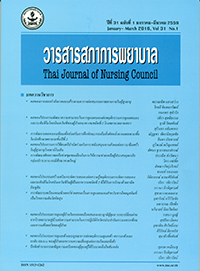ผลของโปรแกรมพัฒนาความสามารถในการดูแลตนเองต่อพฤติกรรมการ ดูแลตนเองและระดับฮีโมโกลบินเอวันซี ของผู้ป่วยเบาหวานชนิดที่ 2 โรงพยาบาลลานสกา
Keywords:
โปรแกรมพัฒนาความสามารถในการดูแลตนเอง พฤติกรรมการดูแลตนเอง, ระดับฮีโมโกลบินเอวันซี ผู้ป่วยเบาหวานชนิดที่ 2, self-care programme, self-care behaviour, A1c haemoglobin level, type-2 diabetes patientsAbstract
บทคัดย่อ: วัตถุประสงค์: ศึกษาผลของโปรแกรมพัฒนาความสามารถในการดูแลตนเอง ต่อพฤติกรรมการดูแลตนเองและระดับฮีโมโกลบินเอวันซีของผู้ป่วยเบาหวานชนิดที่ 2
การออกแบบการวิจัย: การวิจัยกึ่งทดลอง แบบสองกลุ่ม วัดผลก่อนและหลังการทดลอง
วิธีดำเนินการวิจัย: กลุ่มตัวอย่างเป็นผู้ป่วยเบาหวานที่มารับบริการคลินิกเบาหวาน จำนวน 80 ราย ได้จากการเลือกแบบเจาะจง แบ่งเป็นกลุ่มทดลองและกลุ่มควบคุม กลุ่มละ 40 ราย กลุ่มทดลองเข้าร่วมโปรแกรมพัฒนาความสามารถในการดูแลตนเอง โดยจัดกิจกรรม กลุ่มสัมพันธ์ ทบทวนวิเคราะห์ปัญหา การประเมินและตัดสินใจตั้งเป้าหมาย การให้ความรู้ การฝึกปฏิบัติ ส่วนกลุ่มควบคุมได้รับการดูแลปกติ เครื่องมือที่ใช้ในการเก็บรวบรวมข้อมูล ได้แก่ แบบบันทึกข้อมูลส่วนบุคคล แบบประเมินพฤติกรรมการดูแลตนเอง และแบบบันทึก ผลการตรวจฮีโมโกลบินเอวันซี วิเคราะห์ข้อมูลโดยใช้สถิติเชิงพรรณนา สถิติไค-สแควร์ และสถิติทดสอบที
ผลการวิจัย: พบว่า หลังเข้าร่วมโปรแกรม ฯ กลุ่มทดลองมีคะแนนเฉลี่ยพฤติกรรม การดูแลตนเองสูงกว่าก่อนเข้าร่วมโปรแกรมฯ ค่าเฉลี่ยระดับฮีโมโกลบินเอวันซีในเลือดต่ำกว่า ก่อนเข้าร่วมโปรแกรม อย่างมีนัยสำคัญทางสถิติ (p <.001) และมีค่าเฉลี่ยคะแนนพฤติกรรม การดูแลตนเองเพิ่มขึ้นสูงกว่ากลุ่มควบคุม มีค่าเฉลี่ยระดับฮีโมโกลบินเอวันซีลดลงต่ำกว่า กลุ่มควบคุม อย่างมีนัยสำคัญทางสถิติ (p <.01)
ข้อเสนอแนะ: ควรนำโปรแกรม ฯ ไปใช้กับผู้ป่วยเบาหวานและศึกษาติดตามในระยะ ยาวเพิ่มเติม รวมถึงประเด็นการให้ครอบครัวเข้ามามีส่วนร่วมในดูแล
Abstract: Objective: To study the impact that a specially designed self-care programme
had on self-care behaviour and A1c haemoglobin level in type-2 diabetes patients.
Design: Experimental two-group research with a pre-test and a post-test.
Implementation: This study was conducted on a sample of 80 type-2 diabetes
patients treated at the Diabetes Clinic of Laan Saka Hospital. The 80 subjects, selected by
means of purposive sampling, were equally divided into an experimental group and a
control group. Whilst the control group was given standard care, the experimental
group engaged in the specially designed self-care programme, which involved group
interaction; problem review and analysis; assessment and making target-setting decisions;
education; and practical sessions. Data were collected by means of (1) a personal
information questionnaire; (2) a self-care behaviour assessment form; and (3) an
A1c haemoglobin (HbA1c) level recording form. The data were analysed using
descriptive statistics, chi-square statistics and t-test statistics.
Results: After engaging in the programme, the experimental group members showed
a significant increase in their average self-care behaviour score and a significant decrease
in their average A1c haemoglobin level, both by p < .001. In addition, the experimental
group displayed an averagely higher self-care behaviour score and an averagely lower
A1c haemoglobin level than the control did, both by p < .01.
Recommendations: It is recommended that the specially designed programme
be administered to diabetes patients and that further long-term studies be conducted to
improve the programme. Moreover, it is suggested that family caregivers be trained to
take part in applying the programme to the treatment of their diabetic relatives.
Downloads
References
Wild S. Roglic G, Green A, Sicree R, King H. Global
Prevalence of Diabetes Estimates for the year 2000 and
projections for 2030. Diabetes Care [Internet]. 2004
May [2014 July 25]; Available From: URL:http://
care. diabetesjournals.org/content/27/5/1047.
Policy and Strategy Ministry of Public Health. Public
Health Statistics AD; 2556. (in Thai)
Lansaka Hospital. Medical Statistics Annual Report;
(in Thai)
Hunnaphiruk L, Ronrittichai J, Tongcharoen V,
Leelahakul V, Khumtaweeporn P. Pathophysiology
nursing. 8th ed. Bangkok: Bunsiri printing; 2009.
(in Thai)
Himatongkhum T,Tuntayotai V, Boonnark P,
Deerojanavong C, Nakhasathien S. Situation Analysis
and Literature Review on Diabetes Mellitus and High
Blood Sugar. Bangkok:WVO Printing; 2005 (in Thai)
Jirojgul P, Niputhutapong S, Keanwong T, Pattanasombut
P, Rowsatian N. Physical activity Dietary habits And
the risk of cardiovascular disease in people Suan Dusit
Rajabhat University. SDU Res J 2011; 7: 59-76.
(in Thai)
Thongsan C. Development of Nursing Guidelines for
Self-Management in Food Consumption of Type 2
Diabetic Patients with Uncontrolled Plasma Glucose
Levels. [Master of Nursing Science Thesis]. Nakorn
Si Thummarat: Walailak University; 2007. (in Thai)
Inzucchi SE, Bergenstal RM, Buse JB, Diamant M,
Ferrannini E, Nauck M, et al. Management of
Hyperglycemia in type 2 diabetes: a patient-centered
approach. Position statement of the American Diabetes
Association and the European Association for Study
of Diabetes Diabetologia. 2012;55:1577-96.
Wattradul D, Pamornpol S, Pamorn S, Aoonjit S,
Kaewwongdee S, Nuntajinda R. Effects of health
promotion program on diabetes diet exercise knowledge
and behavioral change in persons with type 2 diabetes.
The journal of Cardio-Thoracic nursing. 2010;21:
-44. (in Thai)
Keratiyutwong P, Hanucharurnkul S. Tracking
long-term effectiveness of self-management programs
for patients with diabetes type 2. Rama Nursing
Journal. 2010;16:293-308. (in Thai)
Pethchit R. Self-care behaviors and blood sugar
control among patients with Diabetes Mellitus at
Khiensa Hospital, Suratthani Province. The southern
college network journal of nursing and public health.
;2:15-28. (in Thai)
Kumloypha K. Health Behaviors of Diabetic Patients
in the Diabetes Mellitus Clinic of Kangsanamnang
Hospital, Nakhonratchasima Province. The Journal
of Boromarajonani College of Nursing. 2011;17:
-30. (in Thai)
Hanucharurnkul S. Nursing Research : Self-care
Among Persons with Diabetes in Thailand. Journal
of Research Methodology. 2002; 2(15):191-222.
(in Thai)
Chareonukul A, Suriyo Y, Trenon P. The relationship
between the levels of talent development to self-care
the level of hemoglobin HbA1C in patients with type
diabetes who can not control. Journal of Public
Health. 2012;22:37-48. (in Thai)
Charoen R, Pukdeewong N, Namwongprom A. Effects
of a Knowledge Development and Family Participation
Program on Health Behaviors and Glycemic Control
in Older Persons with Type 2 Diabetes. Rama Nursing
Journal. 2010;16:279-92. (in Thai)
Polit DF, Hungler BP. Nursing research: Principles
and methods. (5th ed.). Philadelphia. J.B. Lippincott
co; 1995.
Koatdok S. Factors associated with self-care behaviors
of diabetic patients who treat at outpatient department
in Hospital Bhumibol Adulyadej. [Master Thesis].
Bangkok: Kasetsart University; 2012. (in Thai)
Diabetic Mellitus [monograph on internet ]. Embios
Worldwide ; 2010.
Wongsunopparat B, Ngarmukos C, Saibuathong N.
Glycemic Control in Persons with Diabetes after
Attending a Group Educational Program for Diabetes
Self-Management. Rama Nursing Journal. 2008;14:
-97. (in Thai)
Archasantisuk P, Oba N, Vichitkaew N, Effects of
Supportive and Educative Nursing Care on Self-care
Behaviors and Level of Hemoglobin A1C in Diabetes
Mellitus Patients. Journal of Nursing Science Naresuan
University. 2008;2:66-77. (in Thai)
Diabetes Association of Thailand under the Royal
Patronage, The endocrine Society of Thailand and
the National Health Security Office. Guidelines for
diabetes. Bangkok: The Rungsin printing; 2009.
(in Thai)








